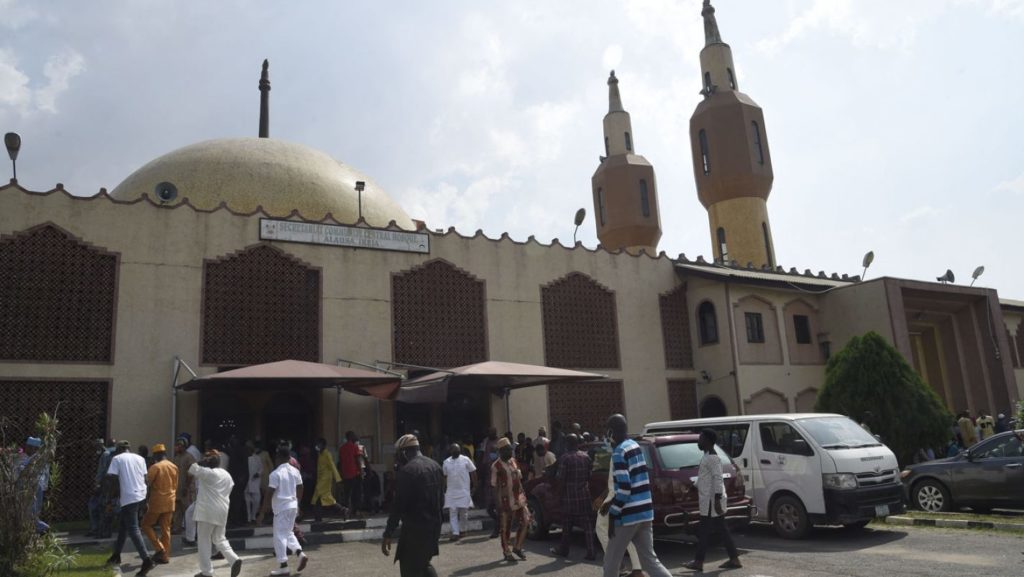Prayers and hymns filled the Ikoyi Baptist Church at a recent Sunday sermon before the pastor delivered a message from the pulpit: Do the right thing and get the jab.
Downstairs in the carpark in the wealthy Ikoyi area of Nigeria’s economic capital Lagos, worshippers in their Sunday finest lined up to register for a first shot of a Covid-19 vaccine.
Fearing a surge in cases over the holiday season and wary of new variants, Nigeria is recruiting religious leaders, churches, mosques and government offices to mobilise its vaccination campaign.
Those worries will likely deepen after Nigeria on Wednesday reported its first cases of the Omicron variant that has prompted new travel bans.
Africa’s most populous nation has so far mostly escaped the brunt of the global pandemic that ravaged Europe and elsewhere after coronavirus emerged in December 2019.
Recorded cases are low — around 214,000 registered infections and just under 3,000 deaths since the pandemic began — although that is likely partly due to low testing rates.
But the country of some 210 million people has fully vaccinated only 3.5 million people and given 6.5 million one shot — far off a target of inoculating around 112 million, or 70 percent of the adult population, by the end of next year.
For a religious society like Nigeria, churches and mosques have in the past proven effective in mobilising sceptical communities to get vaccinated as they were with a polio campaign a decade ago.
“The mosques and churches get the largest crowds. It is also a way to reduce the risk and access more people,” said Dr. Atinuke Onayiga, a senior Lagos health official visiting the Ikoyi church.
“A lot of people don’t want to queue up, so we bring it to their doorstep.”
Across the other side of Lagos, in the mainland district of Alausa, Friday prayers at the Lagos State Secretariat mosque followed a similar pattern.
“Now it’s happening here, I should do it,” said Lawal Abujeli, 35, sitting in a white plastic chair outside the mosque waiting to be vaccinated.
“I wasn’t interested before, but here I can trust it.”
Short expiry dates
In some wealthy nations, three-quarters or more of the adult population have had two doses and a campaign is underway for a third “booster” jab.
But as in most developing economies, the rate in Nigeria is much lower and vaccine hesitancy is common.
Nigeria was scarred by a disastrous clinical trial in 1996, when 11 children died and dozens were left disabled after being given an anti-meningitis jab made by Pfizer. The US giant reached a settlement with plaintiffs in 2011.
“A lack of vaccination in our countries will breed fertile ground for the virus to develop mutations,” warned Mukhtar Muhammed, a presidential adviser on Covid-19, urging developing nations to do more.
But vaccine availability is also an issue.
The global vaccine-sharing system Covax, led by the WHO, is providing low- and middle-income nations with doses financed by wealthier states.
But Covax and the Africa Centres for Disease Control and Prevention together warned this week that donations to Africa were often ad-hoc, at short notice and with short shelf lives, and this made planning tough.
Nigeria has received around 30 million doses so far, with another 60 million on their way early next year.
But some current AstraZeneca doses need to be used quickly while other vaccines have a longer shelf life, complicating delivery on the ground.
Around 2.5 million doses of AstraZeneca need to be used in Nigeria by year’s end, said Peter Hawkins, UNICEF’s country representative.
“Normally a country like Nigeria would not receive any vaccine or drugs without a six-month expiry date. Some of these vaccines have six-week expiry dates,” he told AFP.
“Now with four types of vaccine you have to juggle which ones are you using and which ones you have to prioritise… It’s a very complex logistical and mathematical equation.”
Office by office
In another effort to promote mass vaccinations, Nigerian federal government employees are now required to show evidence of vaccination or a Covid test before entering offices.
Outside some federal buildings in the capital Abuja, dozens of workers were turned away on Wednesday as new rules were enforced. Some were directed to vaccine centres.
“I am not sick. I am not going to take a test,” said civil servant Ifeanyi Nwazo. “They want to force us to get an injection. Why?”
Health authorities plan office-to-office vaccinations in federal buildings.
Dr Ismail Abdus-Salam, Lagos state Covid response incident manager, said religious houses were also a effective way to spread the word back to communities.
“We also improve awareness,” he said outside the Alausa mosque. “They spread the message to people: ‘I’ve been vaccinated and there is no problem with me, and you can get vaccinated’.”
But for some worshippers like Mustapha Adetay, even the mosque campaign had yet to shake off their worries about the jab.
“I am still doubting to be sincere, some say it has negative health effects,” said Adetay, 53, an engineer, walking out of the mosque.
“If I was convinced, I would have all my family take it. But I am not really convinced. But I will think about it.”
Source: Guardian.ng

